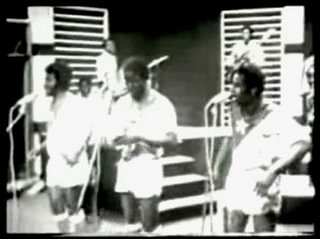
A lot of classic Congolese music is back on CD this month. These inportant Sonodisc recordings come and go on the market, so it's great to see so many being reissued at the same time.
Tabu Ley Rochereau And Afrisa International -
Kaful Mayay 1973Not only neo-traditional 'Kaful Mayay' but also gorgeous 'Nzale,' hypnotic 'Aon-Aon' and 5 other tracks from the early 70s, including two making their first appearance on CD.
Grand Kalle et l'African Jazz -
Merveilles du PasseSo good it took three CDs to capture it all! Grand Kallé, Dr. Nico, Dechaud, Mujos, Vicky Longomba, Rochereau, (briefly) Manu Dibango: the first great modern Congolese band at its peak. Marvelous indeed and truly essential.
More titles now available: (
see more info on the whole series here)
Grand Kallé & L'african Jazz - Merveilles Du Passé, Vol. 2 (1961-1962)
Grand Kallé & L'african Jazz - Succes Des Années 50/60, Vol. 1
Grand Kallé & L'african Jazz - Succes Des Années 50/60, Vol. 2
Grand Kallé & L'african Team - Volume 1
Grand Kallé & L'african Team - Volume 3
Grand Kallé & L'african Team - Volume 2
African Fiesta - Nico, Kwamy, Rochereau & L'african Fiesta
African Fiesta - Makila Eyina Nzoto
Tabu Ley Rochereau - Le Seigneur Rochereau
Rochereau, Tabu Ley - À L'olympia
Rochereau, Tabu Ley - L'afrisa International
Rochereau & Franco - Lisanga Ya Banganga (2 CDs)
Tabu Ley Rochereau - Rochereau, Sam Mangwana & L'African Fiesta National
Rochereau, Tabu Ley - Tete Nakozonga
Rochereau, Tabu Ley - Sacramento
Rochereau, Tabu Ley - Rochereau & L'african Fiesta National, Vol. 1 (1964-1966)
Tabu Ley Rochereau And Afrisa International - Kaful Mayay 1973-75
Rochereau, Tabu Ley - Rochereau & L'african Fiesta National, Vol. 2 (1966-1969)
Tabu Ley Rochereau - 1968/1969
Tabu Ley Rochereau - 1971/1972/1973
Rochereau, Tabu Ley - Sorozo
These CDs are all available via
cdRoots



